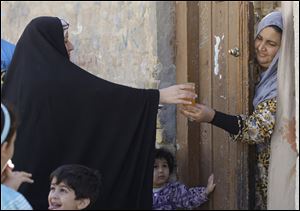
Iraqis torn over U.S. troop pullout
Some cheer, some fret about violence
10/23/2011
Umm Mohammed distributes sweets and juice as she celebrates the announcement that after nearly nine years of war, U.S. troops are to withdraw. Yet some Iraqis fear violence will worsen and Iran's influence will increase.
BAGHDAD -- For the first time in decades, Iraqis face a future on their own, with neither Saddam Hussein's iron fist nor U.S. military might to hold them together. This has been both their dream and nightmare: They wanted Americans (the occupiers) to go, but they wanted Americans (the protectors) to stay.
Now many fear a rise in violence, growing Iranian influence, and political turmoil after President Obama's announcement that all U.S. forces will leave by year's end.
Iraqis questioned what more than eight years of war and tens of thousands of Iraqi and U.S. lives lost had wrought. They wondered how their still-struggling democracy could face the challenges ahead.
Rifaat Khazim, a Shiite from the city of Basra, said, "I do not think that this withdrawal will bring anything better to Iraq or that Iraqi leaders will be able to achieve stability and security. … Most of the Iraqis yearn now for Saddam's time. Now, Iraq is defenseless in the face of the threats by the neighboring countries."
Raad Hussein of Sadr City, said he feared the return of "masked gunmen, wearing black," a common sight in the worst of the sectarian violence.
Across the country there was a strong sense of disbelief. The Americans never would really leave, many Iraqis thought. Some celebrated the exit of foreign occupiers and the emergence of real sovereignty. But there was the apprehension that things would get worse.
"The United States should not turn its back on Iraq," Labid Abawi, the deputy foreign minister, said yesterday. "Iraq needs the United States, and the United States needs Iraq."
Though greatly reduced from the depths of near-civil war from 2006 to 2008, shooting and bombings rattle Iraqis daily. All the elements from those darkest days remain: al-Qaeda militants, Shiite militias, Sunni insurgents.
For the Iraqis, the Americans were both the cause of those woes and the bulwark against them exploding. Many blame the 2003 U.S.-led invasion for unleashing all the demons kept bottled up by Saddam, and allowing new ones -- like al-Qaeda -- to slip in.
Yet U.S. troop reinforcements helped rein them in by 2008. Many feel the powerful U.S. presence prevents Iraqi politicians from dragging the country into the worst of sectarian reprisals and hatreds.
Almost 40,000 U.S. troops remain in Iraq, but all will leave by Dec. 31.
The Obama Administration, concerned over violence and Iranian influence, pushed to keep thousands of troops in Iraq in a significant training mission. Prime Minister Nouri al-Maliki and other Iraqi officials expressed support, and they negotiated for months.
But talks ran aground over Iraqi opposition to giving U.S. troops legal immunity that would shield them from Iraqi prosecution.
"When the Americans asked for immunity, the Iraqi side answered that it was not possible," Mr. al-Maliki said yesterday.
Many Iraqis, both Sunnis and Shiites, are sure the departure of U.S. forces will lead to a rise in Iranian influence.
"The withdrawal announcement is a message to the Iranians to come and take over Iraq. The Iraqis are the real losers here. … ," Adel al-Dulaimi, a Sunni in Baghdad, said.
But some, such as those who celebrated the closing of a U.S. base in Mosul, saw only possibilities.
Sheik Shakir Ghalib, said, "The day of the end of the occupation means such a great happiness, I can't describe it."
Saif Qassim, a Sunni from Mosul, said, "The Iraqi people are the winners because a few months from now, we will walk in the streets without seeing U.S. troops."
Mr. Al-Maliki said he still wants U.S. help in training Iraqi forces to use billions of dollars worth of military equipment that Baghdad is buying from the United States. About 160 troops will stay at the U.S. Embassy in Baghdad to help with training plans
U.S. officials stressed that Washington will keep strong diplomatic ties with Baghdad. "Even as our troops come home, the United States' commitment to Iraq's future as a secure, stable, democratic nation remains as strong as ever," Secretary of State Hillary Clinton said.